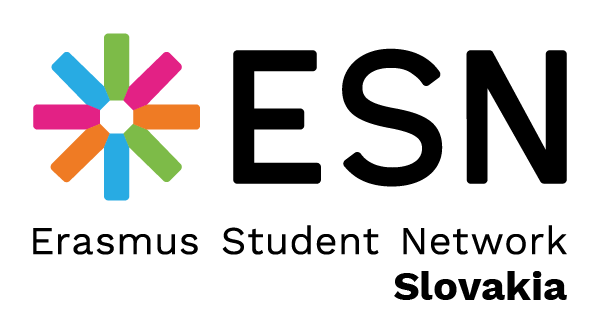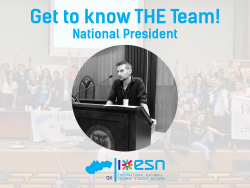Can you please introduce yourself (who are you, where are you from, what do you study)?
I was born and raised in the capital of my country, Bratislava. Here I finished my studies at Comenius University in general medicine in 2015. At the same University I´m a PhD student since September 2015, so right now I’m doing research, focusing on metabolism, cognition and the beneficial effects of exercise. Besides that I occasionally teach students in pathological physiology. In the future I would like to do some research internship abroad and after my PhD studies do a specialisation in endocrinology. Besides my work I dedicate a lot of time to ESN, it’s kind of expected from the president, isn’t it? (Haha) Well, and if there is still sometime left I’m an avid reader, I love travelling, running and spending time with friends.
How long have you been a member of ESN and what were your roles before becoming a member of national board?
I joined ESN after my Erasmus in Murcia, Spain in 2014. Erasmus was such a life and mind changing experience for me that I didn’t want to lose contact with international world. First year and a half I was a buddy and active member without any ambitions for any other position. I found a lot of friends in my section among ESNers and Erasmus, and that was the biggest motivation for me to stay in ESN after my graduation. At the end of 2015 I attended NP and then I started to be interested in other dimensions of ESN. I was told about the project Mov’inEurope, focusing on promoting mobility and there I found my personal story. Since there was no candidate I applied for the position of national coordinator of that project and I was elected.
What is your position in NB and how long have you been doing it?
I have an honour to be the national president. I was elected in NP Czechoslovakia that took place in small Czech village Třemešek in September 2016. The funny thing is that I haven’t heard about that place before I went there to be elected. Most likely it was the first and last time in my life I went there, but who knows... In NP that took place in December 2016, I was re-elected to the same position.
Can you describe a typical day of president of ESN SK?
That’s a tricky question haha. Well, the time I start working depends on if we have patients. If so, I have to wake up early around 6am. I spend all day at work where we’re doing clinical trials and working on publications and conferences. As I mentioned, sometimes I’m also teaching medicine students so my working day is far from being monotonous. I usually finish between 4 or 6pm and after some break I’m opening my ESN office – that’s how I like to call the time spent on work for ESN. In the evenings I’m trying to find time for sport or theatre or cinema. I usually go to sleep after midnight. If you spend a year in Spain, it’s impossible to get used to going to sleep before midnight and waking up earlyJ. During weekends I try to do things for which I didn’t have time during the week - attend ESN events or travel with my friends.
What was your most valuable experience connected to being in NB so far?
Generally, I think that being a NB member is a valuable experience itself; every day there is so much you can learn and get. Therefore it’s hard to name one particular thing. As a president I should lead all members of our national level and it means communicating and cooperating with many different personalities. Besides that I have to be in touch with many more members in our network both home and abroad, as well as partners like National Agency. So if I have to pick one thing what I’m learning the most as a president, it’s dealing with different characters and based on that finding ways to make our cooperation as effective and nice at the same time as possible.
What were the most challenging tasks that you had to deal with?
The answer to this question is similar to the previous one – dealing with different personalities brings valuable experience at the end, but the process can be truly challenging. ESN is a network, and that means that there are just few tasks you can really do and complete on your own. Most of the work is a result of cooperation, and that needs patience and appropriate approach toward different people.
What is your biggest goal that you want to accomplish before the end of your mandate?
Every position in the national level is specific. The main role of the president is coordination and giving a hand to my fellow NB members and coordinators with their tasks. I feel partially responsible for the work of all of them, so my personal goal is that everyone will have a feeling of good job done at the end of our mandates. I’m sure that in the first place of any student organisation should be a positive atmosphere, so my biggest goal is to maintain a good and motivational atmosphere in our network.
Have you attended any international events? If so, which ones and what was the best about them?
Yes, I have attended 2 national coordinators meetings in Brussels, Annual General Meeting in Warsaw, CentralEuropeanPlatform in Pecs and Council of National Delegates in Krakow. Every one of them brought me a different experience, but I enjoyed all of them. They gave me an opportunity to see how ESN works on the international level, the endless possibilities of our network and I also met great people from different countries that I can proudly consider as my friends.
What is your message for people who can’t decide whether to join NB of ESN or not?
There is a lot of clichés that could be used to answer this question, I’ll try to avoid them. Being a part of NB is an experience that can be hardly compared to anything. It gives me a lot to my work, as well as to my personal life and not just for now, but also for the future. As much as it’s about experience and benefits, it’s also about responsibility and hard work. I know that it’s not possible to dedicate all the time to ESN and everyone of us has studies, work or even both of them. However, without work and dedication of the NB members we can hardly move our network forward. It means doing the tasks that have to be done even if they aren’t our favourite. But that’s usually a part of any job you do.


Follow us